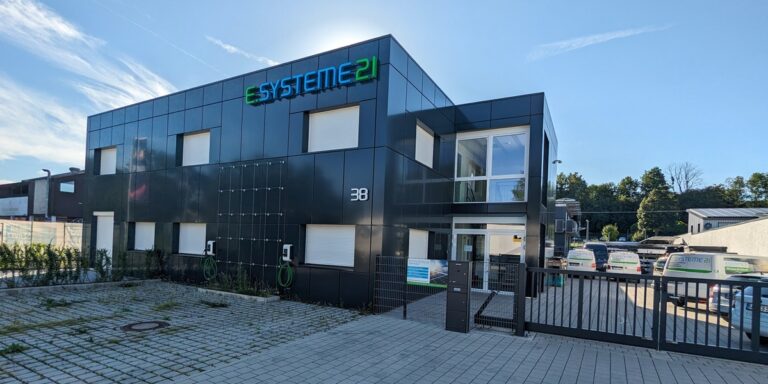Esysteme21 has built a 100% self-sufficient energy system with solar photovoltaics, hydrogen and battery storage. The German solar energy company describes the concept as a solution for medium-sized companies.
Esysteme21, a German solar energy company, claims to have achieved full energy self-sufficiency using solar photovoltaics, hydrogen and battery storage. It now offers this option to industrial and commercial customers.
Norbert Unterharnscheidt, director of Esysteme21, explains pv magazine that their energy costs for electricity and heat now average €0.25 ($0.27)/kWh.
Initially, the company expanded its building with 360 square meters of office space and 300 square meters of storage space, adding thermal insulation and a green facade. They have also converted parking lots and areas into climate-friendly surfaces with new, permeable paving.
The new energy solution includes an 80 kW solar system on the roof and facade, combined with an 80 kWh battery storage system. This setup supports an electrolysis system that produces and stores hydrogen, which can later be converted back into electricity using a fuel cell during winter or during periods of little sunshine. Residual heat from these processes supports heating and hot water preparation.
The heating is supplemented with a heat pump and innovative hydrogen dark radiators, which emit radiant heat comparable to infrared radiators. The site also includes three charging points for electric vehicles powered directly by renewable electricity.
Unterharnscheidt noted continued hydrogen production with plans to fill the storage tanks by September, with excess electricity used for potential future needs or for hydrogen sales to other companies.
The company’s annual electricity needs, including air conditioning and heating, are 17,750 kWh. Since 80,000 kWh of PV electricity is expected annually, they allocate 34,000 kWh for electrolysis and compression, with approximately 6,750 kWh generated from the fuel cell. This leaves a surplus of 32,500 kWh for electromobility and future growth.
The total investment for the energy solution was €600,000, with a further €700,000 spent on building renovations and environmental improvements. Leveraging their experience, Esysteme21 now offers advice to help other companies achieve climate neutrality transformations.
“It is clear to me that such a solution is currently only interesting for a few pioneers,” says Unterharnscheidt. “But it remains important to show what is already possible today and to show that costs remain within limits. While electricity costs are €0.10 in summer, they rise to €0.40 in winter – an annual average of €0.25.”
This content is copyrighted and may not be reused. If you would like to collaborate with us and reuse some of our content, please contact: editors@pv-magazine.com.


